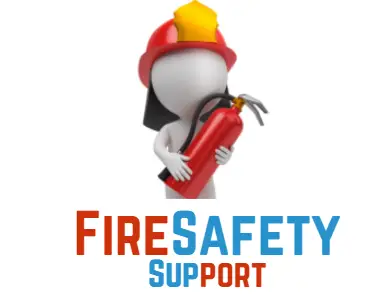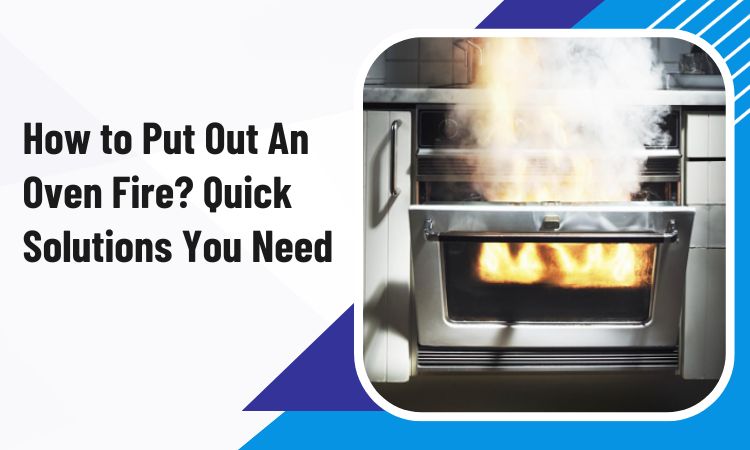To extinguish an oven fire, turn off and unplug the oven, disconnect nearby electrical devices, and use a fire extinguisher, especially for oil, grease, or electrical fires.
If a fire extinguisher is not available, consider using baking soda to smother the flames. While not recommended for grease fires, baking soda can be worth trying for oven fires.
However, this is just the short answer. For a better solution, you should learn the steps in detail. Continue reading our article to find out more about how to put out an oven fire effectively.
Key Takeaways
- In the absence of a fire extinguisher, baking soda can be a great help for putting out oven fires.
- Some of the most common causes of oven fires include dirty ovens, bad ventilation, faulty thermostats and not using baking sheets.
- To stay on the safe side, avoid flammable materials in the oven, unplug electrical appliances before cleaning or use, and always keep a watchful eye on your cooking.
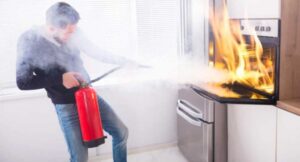
How to Put Out An Oven Fire? 4 Easy Steps
Oven fires are one of the most common types of home fires, and they can be dangerous even if they start in the kitchen. If you ever find yourself dealing with an oven fire, you can quickly take these steps to stay safe:
Step 1: Turn the Oven Off
If it’s safe to do so, turn off and unplug the oven. Take a moment to unplug any nearby electrical appliances or devices. This helps lower the risk of the fire spreading and causing more damage.
Step 2: Grab Your Extinguisher
Not all fires can be tackled with water, especially if they involve oil, grease, or electricity. It’s a good idea for every home to have a fire extinguisher in an easy-to-reach spot. Standard fire extinguishers work for most home fire situations.
Step 3: If the Fire Is Out, Ventilate Your Home
If the previous steps successfully put out the fire, open some windows. This allows smoke and odors to escape safely and gives you a chance to assess the damage.
Step 4: If the Fire Isn’t Out—Call Emergency Services
If the fire persists or starts spreading, it’s time to prioritize safety. Don’t try to handle it on your own. Call your local fire department immediately. Make sure everyone, including family members, pets, and guests, is safely evacuated. Your safety is the top priority.
To know more about how to deal with oven fire, check out this helpful video:
What Should You Do After An Oven Fire?
It can be challenging to deal with the aftermath of an oven fire. Cleaning up soot and smoke requires time and effort. However, it’s crucial to thoroughly clean the oven to prevent any residue that could lead to another flare-up.
If the task seems overwhelming, consider reaching out to a professional fire damage restoration company.
Certified technicians equipped with advanced tools can efficiently handle the situation. As a result, it will ensure a swift restoration of your kitchen.
Pro Tip: While ensuring your kitchen’s safety, you should also know how to put out an ethanol fire.
Is The Oven Safe To Use After A Fire?
Unfortunately, your oven is not safe to use after a fire. The fire could have damaged the walls of the oven and caused them to cook unevenly.
This means that some parts of your oven may be very hot while other parts may be cooler. This can cause burns when you touch the oven or cook food in it.
If you suspect that your oven has been damaged by fire, do not attempt to use it again until it has been repaired by a professional.
How To Put Out An Oven Fire Without A Fire Extinguisher?
If your oven catches fire and you don’t have a fire extinguisher, don’t panic.
Here are some steps to help you put out the fire without a fire extinguisher:
- Turn off the oven or unplug it.
- If you can, open the oven door and remove the food or pan that’s on fire.
- Use baking soda to smother the flames, or use a wet towel to do so if there’s no baking soda available.
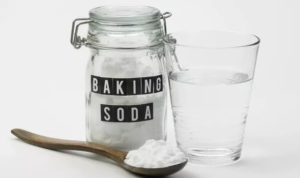
How Does Baking Soda Put Out Oven Fires?
Baking soda can put out oven fires as it is a chemical compound consisting of sodium bicarbonate and water.
While it’s not recommended that you use baking soda to put out a grease fire (since grease fires are not caused by an open flame), if you ever need to put out an oven fire, it may be worth trying.
If you find yourself in the unfortunate situation of having an oven fire, don’t panic. You can put out the flames with baking soda. Follow these easy steps:
- First, turn off the stove and open all your windows. This will help to prevent toxic fumes from filling up your kitchen, which could cause respiratory problems if inhaled.
- Next, grab a bowl and fill it one-third full with baking soda. Stir in water until the mixture is thick but still pourable.
- Pour this mixture onto the flames in your oven, making sure to cover them entirely with baking soda paste.
The baking soda will smother the flames and stop them from spreading further through your oven or even into other rooms in your house.
Do not use water alone, as it will only make matters worse by spreading burning embers around the room instead of putting out the fire.
Can You Put Out An Oven Fire With Water?
You can try to put out an oven fire with water, but it’s not recommended. Oven fires are typically caused by grease or oil being left unattended and heating up. The grease or oil will eventually catch fire and cause smoke to come out of the oven.
The best way to put out an oven fire is to use baking soda or a fire extinguisher. If you do not have either of these things in your home, you can use sand, flour, or salt.
You should also try to turn off the heat source as soon as possible to prevent the fire from spreading further.
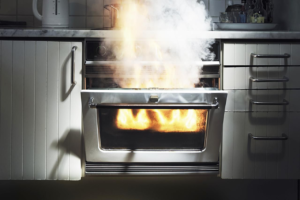
10 Most Common Reasons for An Oven Fire
Oven fires can be disastrous on many occasions, and thus, they can be scary to deal with. Luckily, there are a few simple things you can do to prevent them from happening.
Here are some of the most common causes of oven fires:
A Dirty Oven:
A dirty oven will have a residue of the food that you have cooked in the past. Then, when you cook something else, it will create smoke and sometimes fire due to the excess grease. You should clean up the inside of your oven before cooking again.
Faulty Spark Igniter:
A spark igniter is a device that ignites the gas in your oven. These devices are usually installed outside of the oven but may be defective and cause a fire.
In some cases, the spark igniter may not be installed properly, which could also cause a fire.
Faulty Thermostat:
There can be many reasons for oven fire, but a faulty thermostat or temperature sensor is one of the most common causes.
When a thermostat fails, it will not properly communicate to your oven’s temperature sensor, causing your oven’s temperature to rise more than it should.
Overheated Heating Element:
Sometimes, an oven fire can be caused by overheating. If you notice that your oven’s heating element has become too hot and is creating a risk of fire, turn off the power at the breaker box or fuse box, and do not use the oven until it has cooled down.
High Oven Temperature:
The most common cause of oven fire is cooking at a temperature that is too high. This can occur when the thermostat inside your oven malfunctions or if you turn the temperature up too high when you’re baking and forget about it.
Bad Ventilation:
The most common cause of oven fire is a poor venting system. If your oven has a self-cleaning feature, make sure your vent fan is clear to remove any hazardous fumes.
Sometimes debris can build up around the fan or vent and cause it to malfunction, so be sure to clean out the area near your oven as well as inside it.
Lack of Baking Sheet:
It’s a common mistake to forget to place a baking sheet under dishes that could drip in the oven. Whether you’re baking pies, cobblers, or pizzas, always use a baking sheet to prevent excess liquid from spilling over.
If you forget, make sure to clean your oven thoroughly before the next use.
Use of Wax Paper:
Using wax paper instead of parchment paper in cooking is a bad idea because wax paper can’t handle high heat and may melt or catch fire. You should stick to using wax paper for wrapping cheese and creating non-stick surfaces.
Dropping Foods:
Keeping your oven clean is crucial to avoid potential fires. Even small food bits can burn or smoke at the oven’s base. Moreover, larger pieces of food can become highly flammable when dried out in the oven.
Always use a baking sheet to catch any spills, and check for dropped food before and after each use.
Leaving Food Unattended:
Leaving food unattended in the oven is a common issue in many households. About 33 percent of home fires are caused by unattended cooking, according to the Fire Department of New York.
So, you should always keep an eye on your cooking and set a timer to remind you to remove dishes from the oven.
How To Avoid Oven Fire?
Oven fires are not uncommon in the kitchen, but they can be avoided with a few simple tips. If you want to avoid an oven fire, please keep these tips in mind:
- When using your oven, make sure to keep a safe distance from it.
- Never use flammable materials like cooking spray or grease in your oven.
- Always unplug any electrical appliances before cleaning them or setting them up for use.
- Always keep an eye on your food while it’s in the oven or on the stovetop. If you need to step away from your meal, turn off the heat and close the door before leaving.
- Use timers so you know exactly how long something has been cooking and can turn off the heat at the exact right time.
- Never use an oven mitt when opening a hot oven door as they won’t protect you from burns if there is an electrical problem with your appliance.
Frequently Asked Questions (FAQs):
How Can I Tell If My Oven Is Too Hot?
You can tell if your oven is too hot by measuring the temperature with a thermometer. If you place it in the center of the oven, and it reads 350 degrees F, then your oven is working correctly. If the temperature is higher than that, then you will want to adjust your thermostat or call an expert to fix it for you.
Can You Use Milk to Put Out Fire?
Milk behaves similarly to water when thrown on a fire, so it’s not suitable for oil or electrical fires. However, for other types of fires, using milk should be generally okay.
Can You Use Cornstarch to Put Out Fires?
Avoid using flour or cornstarch on a fire, as they are flammable materials and may pose a risk of causing an explosion.
Conclusion
Hopefully, now you know everything about how to put out an oven fire. It’s easy to get distracted while cooking, but it’s important to stay focused on the task at hand.
You never know when something could go wrong, and if you’re not paying attention, it could cost you a lot more than just your pride.
If you notice that your oven is on fire, immediately turn off the heat and pull out any pots or pans that are being heated. Then use baking soda or baking powder to put out the flames.
If this doesn’t work, call 911 because your house might be at risk of catching fire.
